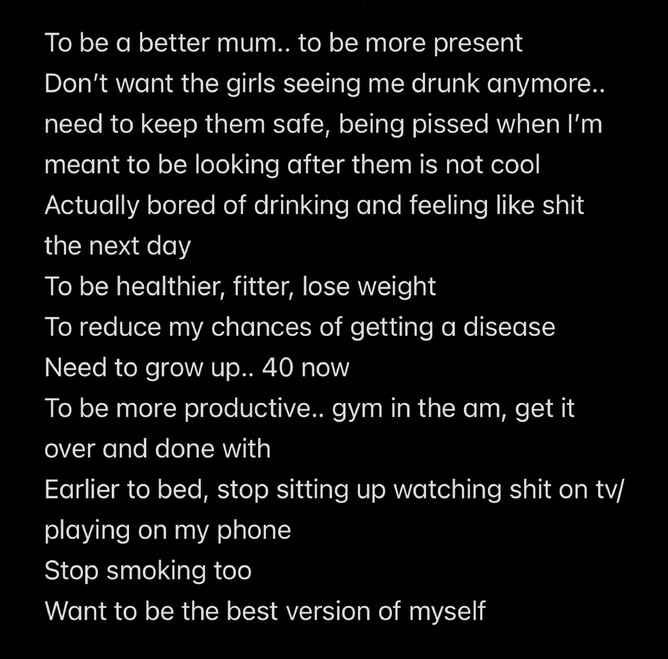Understanding Why You Want to Quit
Deciding to quit alcohol is one of the most significant and transformative decisions a person can make. However, the decision itself is only the beginning of the journey. What truly sets the foundation for lasting sobriety is understanding why you want to quit. Your reasons for choosing sobriety—whether health-related, emotional, or for personal growth—become your personal compass. These reasons help you stay focused, motivated, and resilient when challenges arise.
So often, people will challenge themselves to take part in Dry January or Sober October and white-knuckle their way through the month without ever looking into why they drank in the first place. Then, at 00:01am on the 1st of the following month, they just go straight back to drinking, and straight back to the same habits as before. This defeats the whole point of trying to give up alcohol for a month.
In this post, we’ll dive into why it’s so important to identify your personal reasons for quitting alcohol and how to explore them in a way that makes your decision feel more meaningful.
Why is Understanding Your ‘Why’ So Important?
When you’re clear about why you want to quit drinking, your journey toward sobriety becomes rooted in something deeper than just the desire to stop drinking. Your ‘why’ can serve as your inner guide, helping you stay aligned with your goals even during moments of temptation. This clarity can prevent you from feeling lost or defeated if/when you face challenges along the way. Your personal reasons will also make your sobriety feel more intentional and fulfilling, which strengthens your commitment.
Think of your ‘why’ as a toolkit—when you face tough moments or doubts, your reasons will be there to remind you of the greater purpose behind your decision.
Personally, my main focus was, and always will be, my kids. Becoming a good role model for them, especially when I had been really struggling with parenthood due to be drinking, was the reason I never stopped trying. These days they are so proud of me (I got flowers and a banoffee pie from them for my 3 year soberversary the other week!), and I would never risk losing that.
Exploring Your ‘Why’—Health, Emotional, or Personal Growth?
Your reasons for quitting alcohol can come from different places. It’s not uncommon to have multiple layers of motivation. Below are some of the most common reasons people choose sobriety, which may help you identify which one (or combination) resonates most with you.
Health-Related Reasons
For some, health is the biggest motivator. You might want to quit because you’ve experienced the negative effects alcohol has on your body or you’ve simply decided that you want to take better care of your physical health. This could include:
Better sleep: Alcohol often disrupts your sleep cycle, so quitting may improve your energy levels and overall well-being.
Physical fitness: Reducing alcohol consumption can help you achieve your fitness goals or lose weight.
Mental clarity: Alcohol can fog your thinking and hinder concentration, while sobriety can lead to better focus and mental sharpness.
Avoiding health risks: If you’re concerned about alcohol-related diseases or are dealing with existing health issues like high blood pressure, liver disease, or chronic fatigue, this might be a compelling reason to make a change.
Emotional Reasons
If alcohol has become a coping mechanism for emotional pain or stress, your reason for quitting might be rooted in emotional well-being. Quitting alcohol can provide a chance to:
Break free from emotional numbness: Alcohol can temporarily mask emotions, but true healing comes when we confront those emotions head-on without the need for substances.
Improve mood stability: Alcohol can increase anxiety or depression, so sobriety can offer better emotional balance and resilience.
Heal from trauma or addiction: If alcohol has played a role in coping with past trauma or addiction, sobriety offers the opportunity to heal and grow emotionally.
Personal Growth and Freedom
For others, quitting alcohol is tied to the pursuit of personal growth and freedom. This could mean:
Clarity of mind and purpose: Sobriety allows you to focus on your dreams, passions, and goals without the haze of alcohol clouding your vision.
Personal empowerment: Taking control of your life and making choices based on your true desires—not influenced by alcohol—can be incredibly empowering.
Building new habits: Sobriety opens up space for positive habits, like exercising, journaling, or learning new skills, that align with your growth and self-improvement.
I had a number of different reasons for quitting alcohol - my kids, my mental & physical health, my dreams and my future. Once I actually quit for good, all of these things started to improve. Before, I could never improve my fitness as I was always too hungover to get to the gym. I had major anxiety and lacked the mental clarity to make good decisions. I was functioning at a sub-par level every single day, and could never move forward with my goals due to suffering from constant brain fog.
In the last 3 years, I've improved my life in all areas. I'm fitter than ever, my physical health is great, my mental health is (mostly!) so much better, my personal growth has been incredible - I am constantly learning new things and trying to better myself. None of these things would have happened if I was still drinking and I'm grateful for that decision every single day.
How to Explore Your ‘Why’
Sometimes, it can be difficult to pinpoint your exact reasons for wanting to quit drinking, especially if the decision feels overwhelming. To help you get clearer on your motivations, here are a few reflective questions to guide your exploration:
How does alcohol affect my life?
Take some time to reflect on how alcohol impacts your health, relationships, career, and emotional well-being. Are there specific moments or patterns that stand out? What aspects of your life would improve if you stopped drinking?
How do I feel when I think about quitting alcohol?
Does the idea of quitting bring up feelings of relief, excitement, or fear? Being aware of your emotional response to the idea of quitting can reveal deeper reasons or resistance that may need to be addressed.
What do I want my life to look like moving forward?
Picture your future self—free from alcohol. What does that person look like? What does your day-to-day life feel like? Exploring this vision can help you gain insight into the personal growth or freedom you’re craving.
What would I gain by quitting?
Focus on the positive aspects of sobriety. Think about the health benefits, emotional healing, or personal growth you could experience by making this change. What would you like to gain from a life without alcohol?
Who am I without alcohol?
Alcohol often becomes part of our identity, but who are you without it? Reflecting on this question can help you connect with the truest version of yourself and clarify why sobriety is worth pursuing.
Keeping Your ‘Why’ Close to Your Heart
Once you’ve identified your personal reasons for quitting, write them down. Keep a journal or note where you can revisit your reasons whenever you need motivation or clarity. It’s helpful to also remind yourself that your ‘why’ may evolve over time. As you grow and your perspective shifts, you might find new layers to your motivation, and that’s okay!
When you have a clear sense of purpose behind your decision, sobriety becomes less about restriction and more about creating a life that aligns with your values and vision for the future. Your ‘why’ will be the anchor that keeps you steady through the waves of change, helping you live with intention and purpose.
Below is my list of "why's" which I wrote on my phone on 25th April 2018 in the very early stages of my attempt to get sober. I still doom scroll far too much, but have managed to achieve everything else on the list!
Final Thoughts
Embarking on a journey of sobriety is not a one-size-fits-all experience, but it starts with understanding why you want to quit. Once you have a solid understanding of your personal reasons—whether for health, emotional healing, or personal growth—you’ll be better equipped to navigate the path ahead with strength and clarity. Your ‘why’ will be your guiding light, illuminating your way toward a more fulfilling and alcohol-free life.


